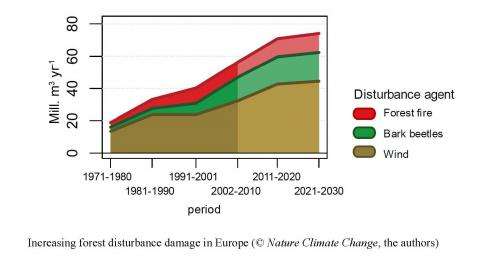Climate change is fueling forest disturbances

Climate change is already altering the environment. Long-lived ecosystems such as forests are particularly vulnerable to the comparatively rapid changes in the climate system. A new international study published this week in Nature Climate Change shows that damage from wind, bark beetles, and wildfires has increased drastically in Europe's forests in recent years. "Disturbances like windthrow and forest fires are part of the natural dynamics of forest ecosystems, and are not, therefore, a catastrophe for the ecosystem as such. However, these disturbances have intensified considerably in recent decades, which increasingly challenges the sustainable management of forest ecosystems", says Rupert Seidl, BOKU Vienna, the principal researcher involved in the study.
The authors show that damage caused by forest disturbance has increased continuously over the last 40 years in Europe, reaching 56 million cubic meters of timber per year in the period 2002 – 2010. Scenario analyses for the coming decades also suggest a continuation of this trend: the study estimates that forest disturbances will increase damage by another million cubic meters of timber every year over the next 20 years. This increase amounts to the approximate timber volume stocking on a forest area corresponding to 7000 soccer fields. The scientists identified climate change as the main driver behind this increase: under assumed stable climatic conditions no substantial further increases in forest disturbances beyond the current levels were found in their simulations. Damage from forest fires was particularly estimated to increase on the Iberian Peninsula, while bark beetle damage increased most strongly in the Alps. Wind damage would be seen to rise most notably in Central and Western Europe.
Increasing disturbances amplify climate change
There is strong feedback from forest disturbances on the climate system. Currently, Europe's forests are mitigating climate change by taking up large quantities of the greenhouse gas carbon dioxide. The carbon loss from increasing tree mortality and disturbance could, however, reduce this uptake and reverse the positive effects of forest management aimed at reducing climate change. The climate-induced increase in forest disturbance could thus further amplify the progression of climate change. In this respect, adapted management strategies, such as increased biodiversity and optimized thinning interventions in Europe's forests, can buffer these carbon losses and support the climate change mitigation function of forests. Europe's forest management will thus need to adapt to changing disturbances in order to keep sustaining the diverse set of ecosystem services provided to society in the future, the study concludes.
More information: "Increasing forest disturbances in Europe and their impact on carbon storage." Rupert Seidl, Mart-Jan Schelhaas, Werner Rammer & Pieter Johannes Verkerk. Nature Climate Change (2014) DOI: 10.1038/nclimate2318 . Received 14 October 2014 Accepted 27 June 2014 Published online 03 August 2014
Journal information: Nature Climate Change
Provided by European Forest Institute
















